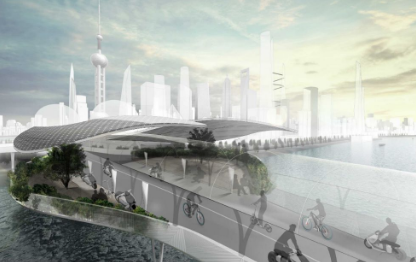BMW’s Dream: A Hyperloop for Electric Bicycles
BMW is in the works to create an elevated network of covered bicycle highways that would wind their way through congested Chinese cities.
Imagine rented electric bikes, with fees charged based on the distance traveled, whisking commuters and tourists (at up to 15 miles per hour) to their destinations.
“It’s our Hyperloop,” Markus Seidel, head of the BMW Technology Office China, said when the idea was debuted in Shanghai this month.
From a performance point of view, that’s an exaggeration. The Hyperloop design proposed by Elon Musk in 2013 uses inductive magnets to propel passenger pods in massive near-vacuum tubes as fast as 760 mph (1,200 km/h). Trials are now underway, and a prototype by Hyperloop One reached reached 192 mph (310 km/h) during a test this fall.
If there is a resemblance between E3 Way and Hyperloop, it’s that both would offer fast, clean electric transit in major cities. Protected bicycle lanes are among most critical factors in getting people to ride bikes to work. In the Netherlands, more than a quarter of all trips are now made by bicycle (compared with 2% in the UK), which the Dutch credit to the country’s 22,000 miles of dedicated paths.
The joint proposal by BMW’s research center in Shanghai and the city’s Tongji University includes two routes totaling about 12 miles. The structure would be built with modular components, and feature a clear ceiling to protect riders from the elements. BMW says it will “open-source” the project to attract partners, but could file for patents if things proceed.
China opened its first elevated bike highway in January, according to state media. That 7.6-kilometer track runs above street level, but integrates the city’s overhead Bus Rapid Transit lanes. Builder Xiamen City Public Bicycle Management estimates 2,023 bicycles per hour can travel at a maximum speed of 25 km/h between the city’s major residential and three business areas.
Category: Mass Transit













